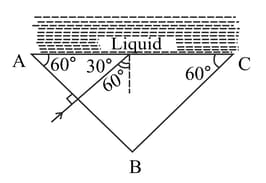Anil Ahlawat Solutions for Chapter: Human Eye and Colourful World, Exercise 2: EXERCISES
Anil Ahlawat Science Solutions for Exercise - Anil Ahlawat Solutions for Chapter: Human Eye and Colourful World, Exercise 2: EXERCISES
Attempt the free practice questions on Chapter 10: Human Eye and Colourful World, Exercise 2: EXERCISES with hints and solutions to strengthen your understanding. NSO Science Olympiad Workbook Grade 10 solutions are prepared by Experienced Embibe Experts.
Questions from Anil Ahlawat Solutions for Chapter: Human Eye and Colourful World, Exercise 2: EXERCISES with Hints & Solutions
A person with a myopic eye cannot see objects beyond distinctly. The type of the corrective lens used to restore proper vision should be:
You are given four sources of light each one providing a light of a single colour - red, blue, green and yellow. Suppose the angle of refraction for a beam of yellow light corresponding to a particular angle of incidence at the interface of two media is . Which of the following statements is correct, if the source of yellow light is replaced with that of other lights without changing the angle of incidence?
Light is incident normally on face of a prism as shown in figure. A liquid of refractive index is placed on face of the prism. The prism is made of glass of refractive index . The limits of for which total internal reflection takes place on face is:

Which of the following statement(s) is are correct regarding scattering of light?
Scattering is responsible for the bluish appearance of the sky.
Clouds having droplets of water scatter all wavelengths almost equal and so are generally white.
Advanced sunrise and delayed sunset.
Consider the given statements and select the correct option which correctly identifies true (T) and false (F).
The focal length of the eye lens increases when eye muscles are relaxed and lens becomes thinner.
Stars appear to twinkle because of movement of air only.
In the dim light, the size of pupil increases.
The blind spot on retina has high concentration of nerve ending.
| T | T | F | F | |
| F | F | T | T | |
| T | F | T | F | |
| F | T | F | T |
